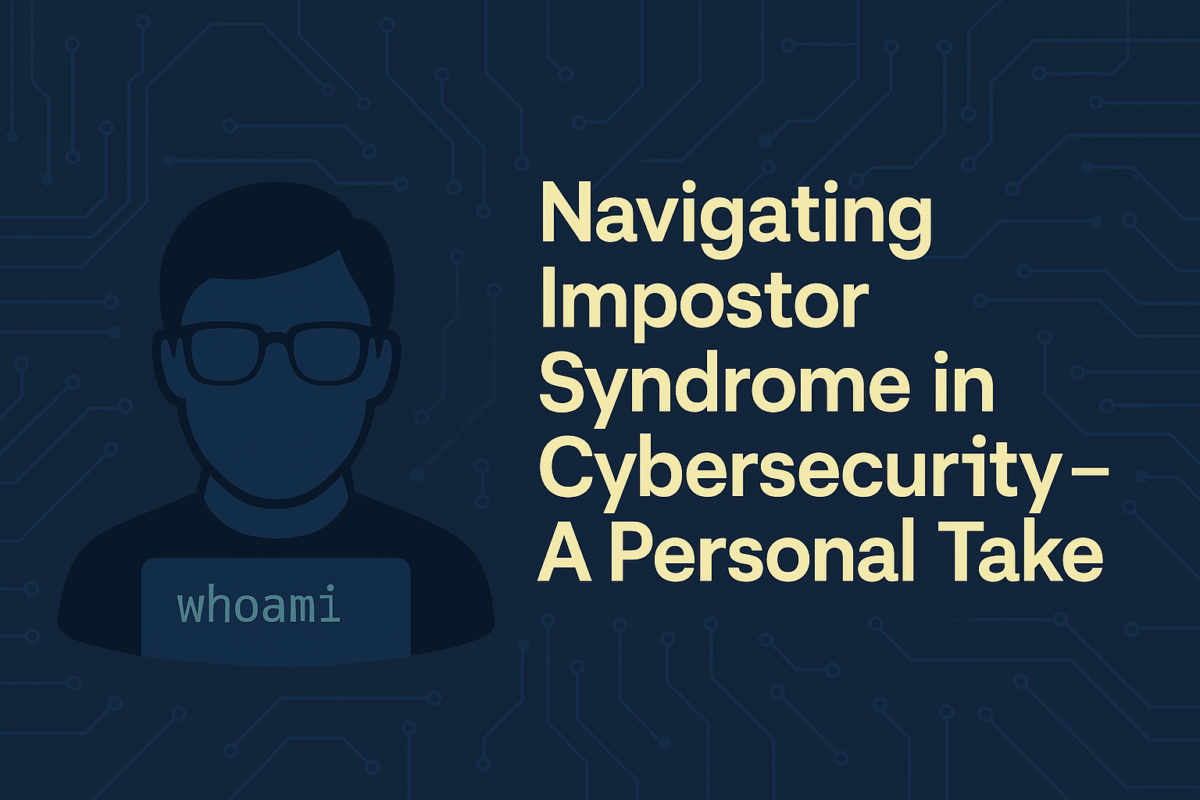
Imposter Syndrome
Imposter syndrome is something that affects many professionals across various industries, but in cybersecurity, it can be particularly brutal. Whether you’re breaking into the field, an established penetration tester, or even leading a red team, there’s always that nagging voice: Do I really belong here? Am I actually good at this? What if someone calls me out as a fraud?
I’ve been there. I still go through it. And if you’re reading this, you probably have too. The good news? You’re not alone, and there are ways to navigate it. Here’s my personal take on how to deal with imposter syndrome in cybersecurity.
Imposter syndrome isn’t just a feeling—it can hold back careers, crush confidence, and make brilliant people doubt themselves unnecessarily.
Whoami?
I’m Richard Jones (PriCSP), a UK-based Offensive Security Professional specializing in penetration testing, red teaming, and advanced security research.
With a strong background spanning networking, application development, IT support, and management, I bring a practical and results-driven approach to cybersecurity.
Currently working as a Senior Penetration Tester at Defence Logic Limited and serving as a Principal-Level Assessor for The Cyber Scheme, I focus on helping organizations and individuals uphold the highest standards in security testing and professional development.
Outside of client engagements, I am deeply involved in the community—developing red team tooling, contributing to open-source projects, participating in Capture the Flag (CTF) competitions, and mentoring those entering the field.
I am passionate about offensive security, reverse engineering, and continuous skill development, and I publish exploits on platforms like ExploitDB and PacketStormSecurity.
Key Skills:
- Penetration Testing | Red Teaming | Vulnerability Assessment
- Web Application Security | Network Security | Reverse Engineering
- Security Research | Cryptology | Steganography
- Programming (C, C#, .NET, Python, Golang, PHP, JS, HTML/CSS)
Certifications:
- Cyber Scheme Team Leader (Web App)
- Certified Digital Forensics Examiner (CDFE)
- MCSI Certified Remote Cybersecurity Intern
I believe that cybersecurity is a lifelong journey of learning, curiosity, and pushing boundaries — and I’m committed to contributing to a safer, stronger industry through technical excellence, mentorship, and ethical hacking.
Why Cybersecurity Breeds Imposter Syndrome
Cybersecurity is a vast, ever-evolving field. No single person can master everything—from malware analysis and reverse engineering to cloud security and exploit development. But when you see others excelling in their niche, it’s easy to compare yourself and feel like you’re not measuring up.
- The pace of change is relentless – New vulnerabilities, exploits, and tools emerge every day, making it feel like you’re constantly playing catch-up.
- Highly skilled peers – You’re surrounded by brilliant minds, whether in person, online, or through research papers and conference talks.
- A culture of scrutiny – Cybersecurity is built on breaking things, questioning assumptions, and rigorous testing, which means your work is always under review.
This environment can make even the most competent professionals doubt their own abilities.
Recognizing Imposter Syndrome
First, it’s important to recognize when you’re experiencing imposter syndrome. Here are some common signs:
- Feeling like you don’t deserve your role or achievements.
- Attributing success to luck rather than skill or hard work.
- Fear of being exposed as a fraud.
- Constantly comparing yourself to others and feeling inadequate.
- Overworking or overcompensating to prove your worth.
Imposter syndrome isn’t classified as a mental illness like anxiety or depression, but it can contribute to mental health struggles.Unchecked, imposter syndrome can fuel anxiety, depression, burnout, and low self-esteem.
If any of these resonate with you, you’re not alone.
My First Penetration Test
I still remember my first major penetration test for a high-profile client. I sat at my desk, staring at Burp Suite’s blinking cursor, heart pounding, hands hesitating over the keyboard. In that moment, despite the certifications I’d earned and the countless hours I’d spent preparing, a single thought kept looping in my mind: “What if I’m not good enough?, What if today’s the day someone realizes I don’t belong here?“
It didn’t matter that I had proven myself before. Imposter syndrome doesn’t listen to logic—it thrives on self-doubt. That day, I learned that feeling unworthy doesn’t mean you are. It just means you care enough to want to do your best.
Experiencing that first-hand made me realize just how common—and sneaky—imposter syndrome can be.
How to Navigate Imposter Syndrome
Cybersecurity rewards precision, but perfectionism can become a trap. Remember: “Done and improving” beats “perfect and paralyzed.
1. Accept That You’ll Never Know Everything (And That’s OK)
No one, not even the top cybersecurity experts, knows everything. The field is too vast. Instead of fixating on what you don’t know, focus on what you do know and continuously build on it. Every expert was once a beginner.
2. Surround Yourself with the Right People
The cybersecurity community is full of people willing to help and share knowledge. Find mentors, peers, and communities that uplift and support you rather than those who belittle others to boost their own ego. Hanging around the right people makes all the difference.
Good places to engage include:
- Security conferences and meetups (BSides, DEF CON, etc.)
- Online communities (Twitter/X, Discord, Reddit, LinkedIn groups)
- Mentorship programs (Cyber mentoring groups, Infosec Twitter mentorships)
3. Keep Track of Your Wins
Imposter syndrome makes you forget your achievements. Keep a “win” journal—document every vulnerability you’ve found, every tough CTF you’ve solved, every time you helped someone understand a security concept. Looking back on these can help shift your perspective.
4. Embrace the Learning Mindset
Instead of seeing gaps in your knowledge as proof that you’re not good enough, see them as opportunities to grow. Cybersecurity is about continuous learning, and even the best professionals learn something new every day. A good pentester isn’t someone who knows everything but someone who knows how to find answers.
5. Share What You Learn
One of the best ways to fight imposter syndrome is to teach others. Write blog posts, create content, present at meetups—helping others reinforces what you know and proves to yourself that you do belong in this field.
6. Don’t Compare Your Chapter 1 to Someone Else’s Chapter 20
It’s easy to compare yourself to senior cybersecurity professionals and feel inadequate. But you’re seeing their highlight reel, not their struggles. Focus on your own progress rather than someone else’s journey.
7. Remember: If You’re Here, You Belong
You wouldn’t be in cybersecurity if you weren’t capable. If you’ve landed a job, earned a certification, or even just have the drive to learn, you deserve to be here. Cybersecurity isn’t about being the best—it’s about being curious, adaptable, and willing to improve.
Feeling like an imposter can actually be a sign of growth—you’re pushing into new territory outside your comfort zone.
Final Thoughts
Imposter syndrome is tough, but it doesn’t have to define you. The fact that you’re questioning your abilities means you care. Instead of letting self-doubt hold you back, use it as fuel to keep learning and growing.
I still struggle with imposter syndrome, but I remind myself: I’m here, I’ve worked for this, and I belong. So do you.
Keep pushing forward. Keep hacking, keep learning, and keep proving to yourself that you deserve to be here.
And remember—struggling with self-doubt doesn’t make you weak. It makes you human.
I’d love to hear your story!
Have you ever struggled with imposter syndrome in cybersecurity? How did you overcome it—or how are you still battling through it?
Let’s share, support, and grow together.
Connect with me on LinkedIn (<< click here) — I’d love to continue the conversation.
By Richard Jones, Penetration Tester 2022 – Present




